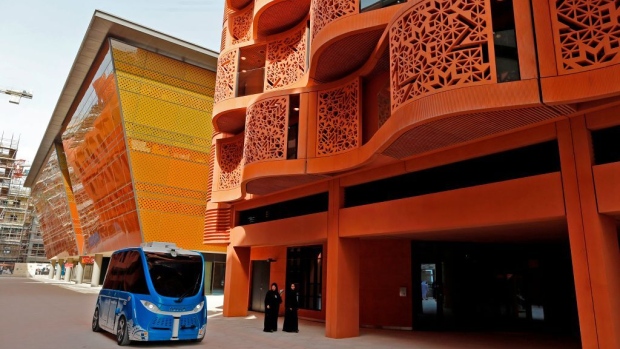Oct 26, 2023
UAE’s Masdar Boosts Caspian Renewable Deals With Azeri Pact
, Bloomberg News

(Bloomberg) -- The United Arab Emirates is expanding renewable energy production in the Caspian and Central Asian regions as the country’s biggest clean-power company moves ahead with plans to generate as much as 10 gigawatts from sources including solar and wind plants in Azerbaijan.
Masdar, owned by the Abu Dhabi government, signed agreements to build 1 GW of power capacity at two solar plants and one onshore wind project, the company said in a statement.
The company also inaugurated the 230 megawatt Garadagh Solar Park in Azerbaijan which will generate half a billion kilowatt-hours of electricity each year, enough to power more than 110,000 homes, Masdar said.
“This is the first large-scale, utility size solar PV project in Azerbaijan,” according to Maryam Al Mazrouei, Masdar’s senior manager for development in the region. The Garadagh project, Masdar’s first in the country, will supply power domestically in Azerbaijan over the next two decades, she said in an interview.
The state-run renewable energy producer has projects around the world, including plants and plans for facilities in the Caspian and Central Asia regions such as in Kazakhstan, Uzbekistan and Turkmenistan.
Masdar plans to double capacity this year as it seeks to have 100 gigawatts of gross capacity by the end of the decade, Chief Executive Mohamed Jameel Al Ramahi said in an interview last month. The 2030 target of 100 gigawatt is based on the gross capacity of projects that Masdar will have stakes in by that time.
The UAE was the first Persian Gulf oil producer to declare a target to reach net zero carbon emissions by 2050 and is preparing to host the United Nations’ COP28 climate summit. The UAE named Masdar Chairman Sultan Al Jaber as COP28 president. His appointment has triggered criticism as he is also the chief executive officer of giant oil producer Abu Dhabi National Oil Co., known as Adnoc, which is investing to boost its capacity to produce oil and gas even as it looks to low-emission technologies like carbon capture.
“We need every country to set clear energy transition plans with defined targets,” Al Jaber said at the inauguration of the Garadagh facility in Baku Thursday. Al Jaber reiterated his call for a worldwide boost in spending to triple renewable energy capacity by 2030.
Azerbaijan’s state energy producer Socar is one of more than 20 companies that have signed up to a COP28 initiative to eliminate methane emissions by 2030 and move to net zero overall emissions by 2050, he said. Al Jaber discussed the initiative at a conference in Abu Dhabi this month, without identifying any of the companies involved. Adnoc aims to have near net zero methane emissions by 2030 and to be net zero by 2045.
Adnoc is also expanding its presence in Azerbaijan. The company agreed in August to buy a 30% equity stake in the Absheron natural gas field in the Caspian Sea. The deal marks the company’s first major international purchase of upstream hydrocarbon assets.
(Updates with comment from Masdar chairman and COP28 president in eighth paragraph, Socar methane pledge in ninth.)
©2023 Bloomberg L.P.





